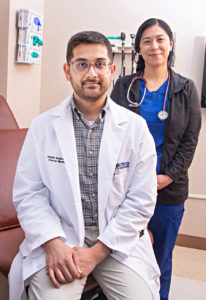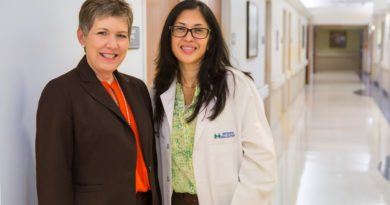A Superhero Without the Cape

Dr. Hassan Asghar
Internal Medicine | Seton & Wellstone Health Partners
By JANNA ZEPP | Photo by BECKY STINEHOUR
Hassan Asghar, DO, internal medicine at Seton Medical Center | Wellstone Health Partners in Harker Heights, is a superhero of sorts.
Unlike Dr. Strange of the Marvel Universe, he’s more Dr. Lifestyle or Dr. Whole Patient, and he works without a cape. His specialty of internal medicine deals with the prevention, diagnosis and treatment of internal diseases. Asghar, like his fellow internists, are skilled in the management of patients who have a lot going on health-wise and they care for hospitalized and ambulatory patients. Often, internists play a major role in teaching and research.
“Because internal medicine is a very broad specialty your experience with providers can vary greatly. You may find some providers prescribe certain medications while others don’t,” Asghar says. “Every provider does things differently. If you find that your primary care provider isn’t a good fit for you don’t be discouraged and feel free to see a couple before you stick to one.”
Asghar is also in a small percentage of physicians in the United States who are Doctors of Osteopathic Medicine, who bring a unique, patient-centered approach to every specialty across the full spectrum of medicine. They are trained to listen and partner with their patients to help them get healthy and stay well. From their first days of medical school, DOs learn to look beyond their patients’ symptoms to understand how lifestyle and environmental factors impact patient well-being. They practice medicine according to the latest science and technology, but also consider options to complement pharmaceuticals and surgery. Combined, internal medicine and osteopathic medicine treat the entire person in a “patient centric” way.
Asghar likes variety, which is why he chose internal medicine for his medical career.
“I like knowing a little about a lot,” Asghar says. “Internal medicine also has a lot of opportunities to branch out for the future should I decide to do so.”
Internists often have subspecialty interests in diseases affecting particular organs or organ systems. For Asghar and his colleagues, they’re seeing a lot of diabetes, hypertension, high cholesterol, or certain types of lung disease.
“Like I said before patients can definitely vary because internal medicine is a very broad field,” he adds.
When asked what he sees coming through his office most, Asghar notes that diabetes is something that really creeps up for some patients.
“A lot of patients come in saying they were found to be prediabetic many years ago only to find out they have very severely uncontrolled diabetes now. The symptoms can often be gradual and progressive causing them to become overlooked,” Asghar says. “If diabetes goes uncontrolled for years it can lead to a multitude of problems such as nerve damage, heart disease, or vision impairment so it is really important to get routine bloodwork.”
The good news, according to Asghar, is that diabetes management is really picking up with great new options to control blood glucose. A lot of newer studies are showing diabetes medications that have benefits for preventing heart related illnesses.
Asghar says patients can do a lot to help speed their recovery or keep their treatment working for them.
“Drinking plenty of water, exercising and keeping a somewhat regulated diet will help with most medical problems. The best thing you can do with your doctor is to be honest. If a medication is not working for you and you are not taking it, please bring it up because there could be better options,” he says. “If you do not want to take a medication, feel free to tell us. A lot of patients feel the stigma of being ‘noncompliant’ or they think misbehaving when they don’t take their medications. This doesn’t need to be the case. Most providers will work with you to reach a common middle ground.”
Asghar credits his early mentors with helping him be a better doctor.
“Dr. Gonzalez from Southwestern University in Georgetown was my microbiology professor who really helped me understand the framework of how things work which helped me learn medicine. Dr. Reddy from Arnot Ogden Medical Center in Elmira, New York, was one of my attendings during training and really helped me learn how to approach things from both an analytical perspective and also with common sense,” he says. “I still keep in touch with Dr. Reddy who is an internal medicine provider. I reach out to him from time to time to continue learning.”
When not focusing on medicine, Asghar is a bit of a foodie. He says he loves the different dining options in Central Texas. And he has family in the area, as well as some back home in Pakistan.
“My father owned gas stations and slowly grew his own business. Currently, he owns a Honda dealership in Pakistan. My mother is a stay at home mother who completed medical school in Pakistan but did not pursue anything more because of her kids. I have one older brother, one younger brother, and one younger sister. A total of four siblings including myself.”
Asghar is also a gamer and graphic novel enthusiast, in addition to being a new father.
“I am passionate about video games. I played many console games in the past but mostly play computer games now. I like to watch movies with my wife. I love Marvel. I love my 2 cats Apollo and Persephone. I just had a baby boy in August, so most of my spare time goes to him now,” says Asghar with a big smile. “I’m tired, but I love being a father.”




